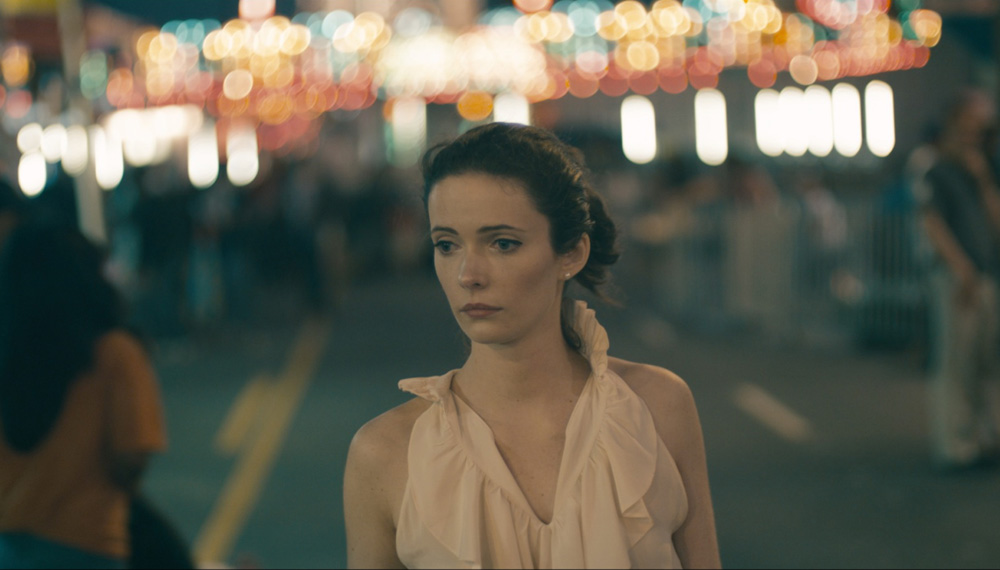All our 2012 Tribeca Film Festival coverage can be found here.
Tucked somewhere between the hurt, uncertainty and biting humor of the moment in the drama “Caroline and Jackie” of when Ryan (David Giuntoli) tells Jackie (Bitsie Tulloch), his girlfriend of seven months, “I’m not entirely sure I want to be part of this family,” there will be a ring of truth for anyone who doesn’t have a choice.
Growing up as the son of two artists in a self-described Bohemian upbringing, the film’s writer/director Adam Christian Clark wasn’t always so sure of where he fit in to his. Recalling that he once asked for a briefcase on his fourth birthday since he “fantasized about being an attorney,” Clark became more fascinated in genetics than following in the footsteps of his parents. Yet while the briefcase sits in his closet to this day, it’s the other stuff that he’s able to unpack in his feature debut that makes it so raw and affecting.
While in New York for the Tribeca Film Festival premiere of his tale of two sisters who are inextricably tied together despite an evening that would surely sever a relationship that wasn’t bound by blood (featuring two searing sibling performances from Tulloch and Marguerite Moreau), Clark spoke about the long road to his first feature, including a detour in China to direct reality television, that led to an assured and accomplished debut.
I’ve always been really fascinated with the relationships of a family, specifically why we’ll be so close to a family member when they’re so mean to us and maybe we’ll run away from them when they’re so kind to us. There seems to be this inalienable bond between blood relatives that just can’t seem to be broken. Even if you have some irreconcilable situation with your parent or your sibling, it would still be this thing you’d have this great desire to reconcile on a death bed. So I wanted to try to figure it out a little bit for myself, then I wanted to do it specifically with sisters because I feel like women especially have so much more of an emotionally rich relationship in that sense oftentimes.
I was already towards that [when] I got a call from a family friend, calling me to stage an intervention for her sister, somebody I’ve known for a very long time, and the sister didn’t need to have an intervention. It really was a desperate measure to reconnect with her sister, something that maybe was ill-directed but really had a kind intention. The intervention didn’t happen because the friends didn’t go along with it, but it gave me an idea.
Even if I hadn’t seen your résumé, which includes directing episodes of “Big Brother,” I was intrigued that you seemed to find a happy medium for controlled chaos between the elegance of a Robert Altman film and a more modern reality-TV style of filming. Did you actually intend to mesh those styles?
What I respect really about that 1970s American film movement is that with Altman’s films or Cassavetes’ films, they’re very naturalistic like a mumblecore film, but they still very much respect the quality and the laws of film. I respect the mumblecore films very much because they’re a very unique and accessible way to tell a story, but it’s just not my style. So when I did a few short films before this, I was fighting against that. I was trying to do really formalistic things, setting up shots like it was an Albert Hitchcock or a Stanley Kubrick film and in doing that, I wasn’t really focusing on a lot of the strengths I had and hundreds of hours of experience in reality TV. I also wasn’t able to focus as much on the acting because of that. So with this film, I took a lot of the skillsets I already had as a reality director and I tried to apply them in a more formal setting.
That applies to the sound design of the film with overlapping dialogue as much as the visual aspects of it. In fact, one of my favorite scenes in the film is the opening credits where you’re able to see childhood pictures, but concentrate on the sounds of both playfulness and squabbling that tell the story of the sister’s upbringing. How did that come about?
There’s an interesting story about that. Everybody’s talking on top of each other, so I employed some very talented — far more talented than I should’ve been able to work with — sound designers. Michael Baird, who did Werner Herzog’s last couple films and is Wong Kar-wai’s sound designer, I’ve been a big, big fan of him for a really long time and [he and the team] did a phenomenal job for what they had to work with throughout the film. But the one exception is that opening title sequence, which I actually temped myself on the Avid [editing system] and then gave it to them as a stylistic reference of what I wanted.
Actually, we went through three or four versions of that where they would do the very professional, wonderful version, but it always seemed to lack something. It didn’t have that same rawness to where you really kind of felt like you were in that moment. On the very last day of the sound mixing, Michael finally [said], “I would never say this, but we should just use your bad one because it’s almost like it’s so bad that we’ve been trained over the years to not be able to do that. We can’t replicate these mistakes.” So that one little part is the part that I sound designed as a nonprofessional sound designer. Then with the stills, I like the stills because they’re these sweet moments juxtaposed sort of sinister undertones, so you could kind of get a sense of the tone before [the movie] started.
There’s probably some movie magic involved, but the geography of the film is quite interesting in that even though there’s a home as a base, you’re able to film an urban environment where everything’s within walking distance. Was that tricky to figure out?
From the beginning, [Jackie] always lived in the Los Feliz area of Los Angeles and I wanted that because it’s one of the few areas of Los Angeles where you can walk to things. With the plot of [her friends] looking for her, it’s one of the few areas where people from Los Angeles wouldn’t be thrown off by the fact that not everybody’s getting in their car all the time. It also helped for that scene where they are all stuck in the car and feeling very confined and uncomfortable because we had been seeing them walk the whole time. The actual interior of the home was in an area of Los Angeles called Harvard Heights, but it’s very accurate to the homes in Los Feliz.
Was there a reason you wanted to do this film as your first feature?
You can say in hindsight because I’m proud of this and I’m certainly not proud of a lot of things I’ve done. It’s taken me almost ten years to get where I’m only this good and I still think I could be five times, ten times, a hundred times better. [laughs] But you go to film school when you’re 18 or whatever age you go to make a feature film and then 10 years pass from that time to when you’re making this. So over the years I was frustrated, I was like, “Where is the feature film and why didn’t it happen?” I was given an opportunity on two different occasions to do different films and I turned them down both times. I had huge amounts of regret about that afterwards, but I just didn’t feel right about those scripts, I didn’t feel like I had the right team of people, the right resources to work with. In making this, I’m really happy I waited that long because I don’t think I would’ve been ready before.
You also went to China in the interim. Did you return to the U.S. with a fresh perspective on what you wanted to do as a filmmaker?
I lived there for over a year and I directed their first reality show, which was this crazy experience for so many reasons, but in doing it, I not only had to direct people in a language that I didn’t understand. Just having the cultural shock of living there for a little over a year, that’s not really enough time to learn the language, but I found that you have [a] survival skill that kicks in after two or three months where you start to understand what people are saying through a different skill set that’s not language. You start to become far more sensitive to body language and intonation and facial expressions just to get by. That was almost more valuable in directing than all the stuff I actually directed and having that forced sensitivity from that cultural experience.
You brought reality TV to China?
I did and I didn’t. It was basically “China’s Next Top Model” and the only difference is it was mainly sponsored by Pepsi. They were trying to launch Pepsi Max, which is basically a rebranding of Diet Pepsi, but make it masculine, so the difference in it being like “America’s Next Top Model” was it actually had men and women, like half and half and living together. It did really, really well and actually it did so well [and] it was such a contrast to the Communist Party’s agenda or principles that year that they actually issued a decree after maybe the sixth or seventh episode aired banning all reality TV in primetime television. That’s still enacted. So I brought it there, but it wasn’t well-received by the government.
Sounds like directing a low-budget American indie was a nice change of pace.
Yeah, I’ve done a lot of little stuff since then, but “Caroline and Jackie” was just fantastic. I always wanted to make small films like that and I hope that I can continue to make them for a long, long time.
“Caroline and Jackie” will show twice more at the Tribeca Film Festival on April 24th at the Clearview Cinemas Chelsea 7 at 9 p.m. and April 28th at 9 p.m. at the AMC Loews 7.





